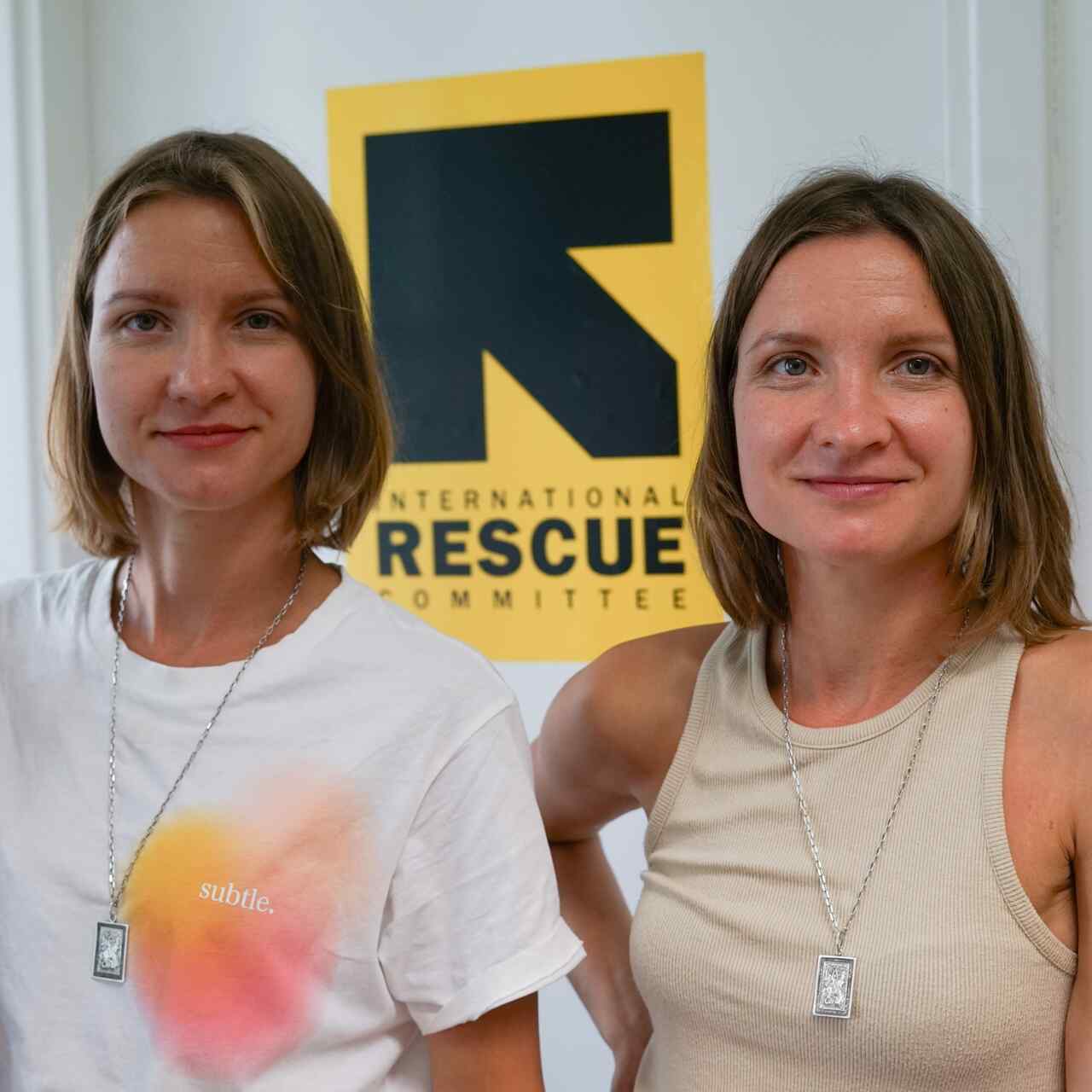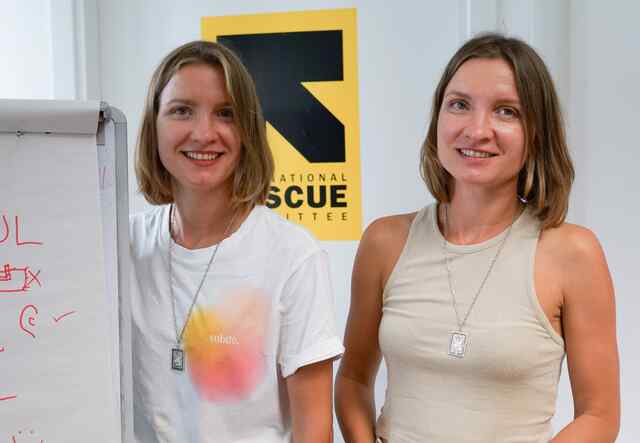
From Ukraine to Italy: Two sisters rediscover life after displacement
Maryna and Ruslana’s Story: IRC Italy helps Ukraine refugees feel welcome

Maryna and Ruslana’s Story: IRC Italy helps Ukraine refugees feel welcome
When 42-year-old twins Maryna and Ruslana boarded a bus from Poland to Italy, they thought they would stay two months at the most. Instead, their temporary refuge from the war in Ukraine turned into a more permanent one. They have remained for over a year and a half - with no hope of returning anytime soon.
Maryna’s and Ruslana’s story is not unlike the more than 110 million people who have been displaced from their homes because of conflict or disaster and forced to start over. In Ukraine, they left behind their jobs as a hairdresser and jewelry-maker, the ability to communicate in their own language, and the know-how to navigate a country’s unique systems.
This meant they had to take on the unimaginable task of acclimating to an entirely new place and way of life. “It’s not worse than in Ukraine, but when you don’t speak the language, it’s hard not understanding the process,” Ruslana said. “The girls from the [safe] space help us out with this.”

Thankfully, in Trieste, Italy, the IRC works hard to help newly arrived asylees and refugees like them to feel at home in their new communities.
During Maryna’s and Ruslana’s first couple of weeks, they experienced the stark contrast between the quietness and peacefulness of Italy to the sounds of war in Ukraine.
We had lived in a city in the western part of Ukraine that was a key civil defense area, so it was a constant target. We couldn’t sleep there. We lived like zombies.
“We had lived in a city in the western part of Ukraine that was a key civil defense area, so it was a constant target. We couldn’t sleep there. We lived like zombies,” Ruslana said.
It may come as a surprise that Trieste is not an uncommon place for families to seek refuge. In fact, since January 2022 to November 2023, the IRC’s team in Trieste supported 28,186 asylum seekers and people on the move entering Italy from the Balkan route. The IRC’s women and girls’ safe space in Trieste has been active for a year and has provided psychosocial support through case management services and group activities to 303 women and single-parent households, like Maryna and Ruslana, coming from 16 different countries, mainly from Ukraine.
Italy itself is at the centre of the European refugee crisis. In 2022, 105,129 people reached Italy through dangerous sea routes. And the number of people arriving through the Balkan route kept growing that year.
Italy became one of the main destination countries within the European Union in 2022 to respond to refugees like Maryna and Ruslana fleeing the war. At the end of 2022, the Italian Ministry of Interiors had recorded about 173,589 Ukrainian refugees’ entries into Italy - mostly women (53%) and children (28%).
The IRC responds to these ongoing refugee crises with a three-fold strategy including directly supporting refugees and asylum seekers, building the capacity of civil society organisations, and strengthening the systems of local institutions and processes. We work across the regions of Lombardy, Sicily, Lazio, Piedmont, Campania and Friuli Venezia Guilia to enhance refugees’ safety, power, education, economic empowerment and mental health.
For Maryna and Ruslana, this meant being empowered through the IRC’s women and girls safe spaces programme.
“For young girls and women, you must have some skills to help you adapt, to understand how the culture works, the history, out of respect,” Maryna said.
For young girls and women, you must have some skills to help you adapt, to understand how the culture works, the history, out of respect.
And that’s exactly what the Women and Girls Safe Spaces programme sets out to help women like them do.
Since 2019, the IRC has partnered with local organisations to set up these safe spaces in Rome, Palermo, Milan, Turin and Trieste. The programme provides women and girls with protection, empowerment and psychosocial support.
In Italy, 501 women and girls have taken part in the IRC’s safe spaces events and case management services. Thanks to roving teams of psychologists, case workers and cultural mediators, the IRC also performs vulnerability triaging and provides holistic case management services to promote clients’ well-being and safety and facilitate their early integration.
The programme’s approach is a proven method that is backed by evidence where migrant women and girls can engage in creative activities and access psychological and case management services, supporting them in creating new social networks and empowering them in a safe environment for them and their children.
For Maryna and Ruslana, this has meant the opportunity to engage in activities such as the Italian speaking club, city tour, gallery tour, laboratory for adults and more.
“I want to work, so it’s normal for me to study the language and any skills which help me in this country. I don’t have a lot of knowledge about this country - the bureaucracy and document requirements,” Ruslana said.
For people looking to enter the local job market, the IRC also has tailored support to help them do just that.
Since 2020, the IRC in Italy has worked with refugees, migrants and vulnerable populations to overcome barriers to entry into complex and unfamiliar job markets while ensuring their new community sees the value they will bring to their local economy.
Our teams also prioritise the most disadvantage population groups, including unaccompanied children and women to ensure they can become self-sufficient and build economic independence over time.
Ruslana dreams of becoming a jeweler once again, working with stained glass and possibly opening her own Etsy shop. Maryna hopes to study and find a job to make enough money to feel free.
But both are taking it one step at a time, not knowing when the war will end or what the future might hold for them.
I hope the war is finished but I don’t know what to do after. We live only day by day. Maybe two days at a time. I don’t have a plan for the future yet. We had a vision of the future but because everything changes so fast we can’t permit ourselves to build a vision for the future.
“I hope the war is finished but I don’t know what to do after. We live only day by day. Maybe two days at a time. I don’t have a plan for the future yet. We had a vision of the future but because everything changes so fast we can’t permit ourselves to build a vision for the future,” Maryna said.
In the meantime, as freshly integrated community members in Italy, they have many tips for newcomers who are about to go through the same process as they did.
“Learn another language. Study the language and culture. English is good, but it’s not enough,” Ruslana advises.
She also tells us: “Find solutions. It always helps to be calm. If you don’t know something, take your phone and try to find some information.”
Maryna also lends helpful advice to parents:
“If the kids are going to stay in Italy, they should go to a kindergarten because it’s a lot easier for the kids to learn the language and culture.”
In the end, home is where the heart is. While they hope to study and get jobs in Trieste, ultimately, they want to return home to Ukraine.
While Italy has extended their welcome to people displaced from their homes, it takes all of us around the world to ensure that the more than 110 million people have what they need to survive, recover and rebuild their lives.
When you support the IRC, you can help them do just that.
Today, the IRC works in over 50 crisis-affected countries, delivering lasting impact in the toughest places on Earth and communities across Europe and the Americas. Our teams provide protection and healthcare, help children recover from trauma and learn, empower individuals and strengthen communities - always with a focus on the unique needs of women and girls.
Every year, the IRC helps thousands of people like Maryna and Ruslana become contributing members of their new communities. But it takes a global community to help them quickly become neighbours, colleagues and friends who shape our lives and communities for the better.
Help people like Maryna and Ruslana recover and rebuild their lives by making a donation to the IRC today. Give now.